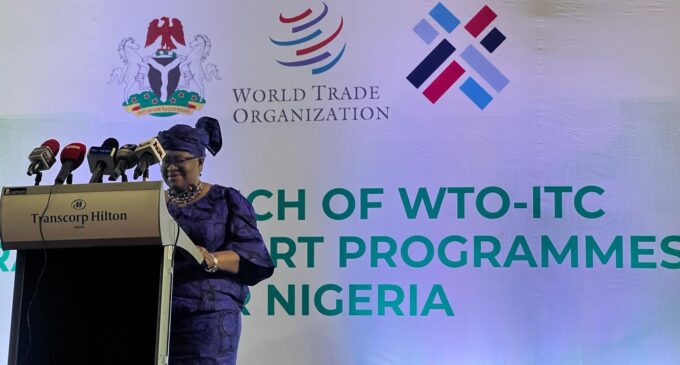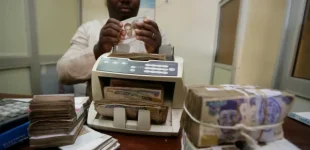WTO inaugurates $1.2m project to enhance quality of agro exports in Nigeria

The World Trade Organisation (WTO) has inaugurated a $1.2 million project to enhance the export quality of Nigeria’s sesame and cowpea products.
Ngozi Okonjo-Iweala, WTO’s director-general, disclosed this on Tuesday at the inauguration of the seven trade support programmes for Nigeria initiated by the WTO, World Bank, and the International Trade Centre (ITC), in Abuja.
Okonjo-Iweala said the projects intend to tackle cases of rejection of Nigeria’s products at the international market.
She said the project was inaugurated with the standards trade development facility (STDF), ITC, and the Nigeria Export Promotion Council (NEPC).
According to the director-general, the project would support international safety and quality certification for sesame and cowpeas in Nigeria.
She said Nigeria’s agricultural sector has the potential to be a major driver of export diversification and job creation, but too much of this potential remains unrealised due to barriers.
“We all know the story about Nigeria being a significant exporter of palm kernel, groundnuts, palm oil, cotton and cocoa, but the country has since become a net importer of many of these goods,” the WTO boss said.
“In fact, Nigeria has not only lost out in agricultural export markets, it is a net food importer spending about billions a year for goods, many of which we can also produce here.
“Nigeria used to be a formidable agricultural exporter. Up to the mid-1960s, the country’s share of world agricultural exports was more than one per cent.
“However, agricultural exports collapsed as the economy shifted towards petroleum exploitation, and by the mid-1980s Nigeria’s world market share for agricultural products has dwindled to less than 0.1 per cent.”
Okonjo-Iweala said some of Nigeria’s unrealised potential has to do with trade-related problems on the supply side, “and that is what this project is seeking to rectify”.
She said Nigeria is the world’s largest producer and consumer of cowpeas and the world’s producer of sesame, exporting to the EU, Türkiye, Japan, South Korea, and other Asian markets.
The economist said Nigerian cowpea and sesame exports have increasingly faced rejections in several destination markets due to non-compliance with international standard phytosanitary measures (SPS) requirements.
‘THE PROJECT WILL ALSO BE USED TO TRAIN LOCAL FOOD SAFETY ADVISERS’
According to Okonjo-Iweala, the new project aims to build the capacities of stakeholders across the sesame and cowpeas value chains to better understand market access requirements.
It would also improve agricultural practices such as pesticide application, hygiene techniques, harvest and post-harvest methods, and food safety, she said.
“The project which will kick off with an initial amount of 1.2 million dollars of which nearly a million comes from STDF will also be used to train local food safety advisers,” the economist said.
“This type of project is one I term a low expenditure, high impact project. The WTO is not a financing agency like the World Bank or IMF, but it has a wonderful secret that I find very attractive.
“It spends small sums of money to make big impact. You cannot imagine how a million-dollar intervention can earn Nigeria hundreds of millions of dollars if not billions in increased agricultural exports.
“Supporting improved incomes for farmers, exporters, businesses and others once agriculture producers and exporters follow the correct sanitary and phytosanitary standards.”
On her part, Nonye Ayeni, executive-director of NEPC, reiterated the challenges of rejection faced by Nigerian food exports, including sesame and cowpea.
She said the challenges are due to poor quality, inefficient procedures and documentation, sanitary and phytosanitary issues, improper packaging, and labelling, among others.
“A good number of these factors led to the decision of WTO/ITC to sponsor the STDF project, which will be backed by expected 30 per cent counterpart funding from NEPC,” she said.
Ayeni said the project is designed to last for three years with the objective of enhancing the integrity of cowpea and the sesame value chain from Nigeria.
Also speaking, Doris Uzoka-Anite, minister of industry, trade, and investment, commended the WTO and the ITC for the inauguration of the STDF programme.
This, she said, would complement the efforts of the federal government under President Bola Tinubu to leverage trade for economic expansion and unlock economic prospects for the Nigerian populace.
“We also heartily welcome today’s launch of the STDF, a global partnership which works to strengthen food safety, animal, and plant health capacity in developing countries,” she said.
“This focus empowers us to put the best of Nigeria on the global market, boosting safety and security for our people and opening doors for our businesses.”
Uzoka-Anite expressed confidence that the programme would support the federal government’s efforts towards ensuring the safety, integrity, and marketability of Nigeria’s goods and services.
















There are no comments at the moment, do you want to add one?
Write a comment